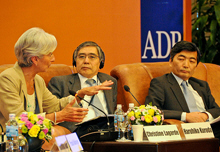
Typical street scene in Santa Ana, El Salvador. (Photo: iStock)
IMF Survey: Panel Calls for Greater Asian Role in International System
May 5, 2011
- Asia’s status, influence in global economy have substantially increased
- Capital flows have to be tackled at both originating and receiving ends
- Special drawing rights need to be more representative of multipolar economy
The world needs an international monetary system that is more efficient, more flexible, and more attuned to the realities of a multipolar global economy, a high-level panel heard today in Hanoi, Vietnam.

ADB’s Kuroda (c), Lagarde of France, and IMF’s Shinohara at Hanoi, Vietnam panel discussion on reforming international monetary system (photo: ADB)
INTERNATIONAL MONETARY SYSTEM
Speaking at a panel discussion on reforming the international monetary system, France’s Finance Minister Christine Lagarde said the current system worked for many years until the global economic crisis, but in the face of capital flows and liquidity problems the world needs a system that is more in synch with the real economy.
“It requires a lot of good will, because improvement will require compromises,” she said. “We will have to come up with pros and cons and a more comprehensive approach to the issues.”
The international monetary system is the set of internationally agreed rules, conventions, and supporting institutions that facilitate international trade and cross-border investment, and the flow of capital among countries. In the wake of the global economic crisis, a number of leading economists, policymakers, and several groups, including the IMF, have offered a variety of perspectives on problems in the international monetary system and how to reinforce it.
France, as chair of the G-20 group of leading advanced and emerging, coorganized the panel along with the Asian Development Bank (ADB), International Monetary Fund (IMF), and Japanese Finance Ministry.
It was held as part of the ADB’s 44th Annual Meeting of the Board of Governors, being hosted this week in Hanoi, where about 4,000 policymakers and officials from government, finance, the private sector, academia, journalism, and civil society are meeting against the backdrop of fears over rising global imbalances.
Greater responsibility
“Asia’s status and influence in the global economy have substantially increased—that means it must accept greater responsibility in global and financial affairs,” said ADB President Haruhiko Kuroda, pointing out that the G-20 now includes six Asian countries. “Already, in some sense, the global community has recognized the importance of Asia. What is needed is greater responsibility.”
Kuroda also highlighted the need for consensus on international monetary system reforms among the IMF’s 187 member countries.
IMF Deputy Managing Director Naoyuki Shinohara pointed out that the IMF has taken several steps in response to the financial crisis, including increasing the quota for underrepresented countries and overhauling its lending toolkit for emerging markets and low-income countries.
“We have been trying to respond to the various diversified needs of our member countries in designing our lending facilities, and we are continuing to look for ways to ensure there are no gaps in the global financial safety nets,” he said.
Regional linkages
The panel also addressed the interaction of the global financial system with regional frameworks, such as the Chiang Mai Initiative Mechanism (CMIM), which now amounts to $120 billion available for ASEAN+3 members in need. The region is also strengthening its surveillance through the Asean+3 Macroeconomic and Research Office.
Kuroda pointed out the newly established European Financial Stability Facility (EFSF) is linked to IMF support. “It may be quite reasonable to have such a linkage between a regional arrangement [like CMIM] and a global arrangement like the IMF,” he said.
Attuning to reality
Lagarde suggested that the system of special drawing rights (SDRs) also needed to be enlarged to be more representative of a multipolar economy that is today’s reality.
Kuroda pointed out the U.S. economy produces about 20 percent of the global GDP in purchasing power parity terms, but accounts for some 60 percent of international reserves held in central banks.
Japanese Finance Minister Yoshihiko Noda said that the SDRs were a currency basket created by IMF, but its use had been limited. “We have to think about the SDR as part of the reform issues faced by IMF,” he said.
Also appearing on the panel, Indian Finance Minister Pranab Mukherjee said any alternative global reserve currency to the dollar would have to inspire confidence and have “acceptability.”
“We should engage in constantly debating these issues and trying to find out a consensus in how to have an alternative currency,” he said.
The objective, panelists agreed, was not to replace the dollar, which is irreplaceable, but to move to a multipolar system.
Tackling capital flows
The panelists also debated possible approaches to managing capital flows. All panelists appreciated the benefits but admitted that volatility was a huge problem.
Mukherjee said he could envision a global framework that could help contain capital flows volatility but there was a need to retain sovereign discretion and be mindful of the diversity of capital flows. He suggested that the capital flows have to be tackled at both the originating and receiving ends, a point that was echoed by Shinohara.
“We have intensified our efforts to study various experiences in emerging economies and how they have responded to capital flow questions,” Shinohara said.
Reform and evolution
Lagarde concluded the discussion by pointing out that all panelists had acknowledged the need to reform or at least evolve the international monetary system, while acknowledging that reform is already under way.
“We should not lose sight of the fact that the international monetary system is not an end in itself,” she said. “It is a means to an economy that on a global basis functions better and is not interested in accumulating massive reserves in various corners, is not interested in engaging in currency wars, but is interested in having more stability and having more predictability in a system that reflects better the forces around the world.”


